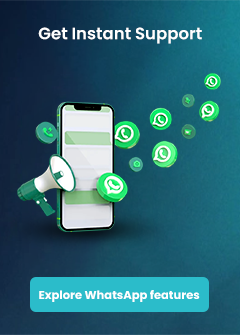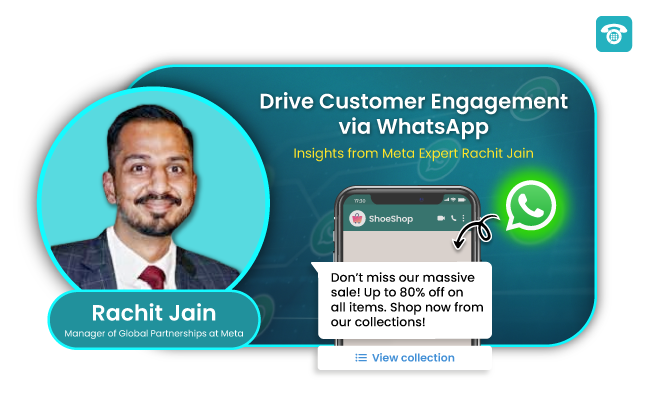In a recent MyOperator webinar, Rachit Jain, Manager of Global Partnerships at Meta, provided invaluable insights on using WhatsApp to drive customer engagement.
As businesses increasingly rely on digital channels, understanding how to use WhatsApp effectively can be a game-changer.
So let’s dive right in and explore the invaluable hacks on how to drive effective customer engagement shared with us by the experts themselves.
Founder Reveals Secret To Building Multi-million Dollar Fintech In India!
The Power of WhatsApp in Customer Engagement
Rachit explained, “Consumers today want to know in real-time if their favorite products are back in stock or if they can easily return a product.” This real-time aspect is crucial for maintaining high levels of customer satisfaction and loyalty.
The integration of WhatsApp into a business’s communication strategy allows for a seamless and instant connection with customers.
Rachit highlighted that the platform is not just for personal use but is increasingly being adopted by brands to enhance their customer service. “A lot of new-age brands are leveraging WhatsApp to increase customer satisfaction,” he mentioned, pointing to the platform’s versatility in handling a variety of customer interactions, from inquiries to transactions.
Understanding Customer Expectations
Today’s customers demand convenience and instant gratification. They expect brands to provide seamless and efficient experiences, particularly when it comes to communication and updates.
Rachit Jain emphasized this shift in customer expectations, noting the importance of real-time interactions.
“Customers are looking for convenient experiences and want to know in real-time if their favorite items are back in stock or if they can easily return a product.”
To meet these expectations, businesses must integrate systems that offer instant updates and simplify the communication process.
This means leveraging platforms like WhatsApp to provide immediate answers and support, ensuring customers feel valued and their needs are promptly addressed. By doing so, brands can build stronger relationships and foster greater loyalty among their customer base.
Related: How Brands Build Stronger Customer Relationships with WhatsApp Business API
Building Effective Customer Journeys
Rachit Jain stressed the importance of creating comprehensive customer journeys on WhatsApp.
He outlined a six-step sales cycle that businesses should consider to maximize engagement and satisfaction. Each step in this cycle plays a crucial role in guiding customers from initial awareness to re-engagement.
Step 1 – Awareness
The first step in the customer journey is building awareness. Rachit highlighted the importance of using WhatsApp to keep customers informed about new products, sales, and other relevant updates.
“Build journeys around ‘It is back in stock’ notifications,” Rachit suggested.
This approach ensures that customers are always in the loop about the latest offerings and can quickly act on their interests.
Step 2 – Discovery
Once customers are aware of the products, the next step is to provide them with detailed information. This can include offering discount codes, detailed product descriptions, and reservation options to encourage deeper engagement.
- “Send out push messages on WhatsApp to engage consumers,” Rachit advised.
By doing so, businesses can help customers make informed decisions and move them further along the purchase path.
Step 3 – Consideration
In the consideration phase, it’s essential to keep potential buyers engaged, especially those who have shown interest but haven’t yet made a purchase.
Rachit emphasized the importance of gentle reminders for customers who have added items to their carts but haven’t completed the transaction.
“Send nudges to users, reminding them of items in their cart,” Rachit recommended.
These timely reminders can help reduce cart abandonment and encourage customers to finalize their purchases.
Step 4 – Purchase
Simplifying the purchasing process is critical for customer satisfaction. Rachit pointed out that WhatsApp Business API can facilitate payments directly within the app, making the transaction process seamless.
“Help users become a member of your service or product on WhatsApp,” Rachit said.
This integration of payment options ensures that customers can complete their purchases quickly and effortlessly.
Step 5- Post-Purchase
After the purchase, maintaining communication is key to ensuring a positive experience. Rachit highlighted the importance of providing customers with easy ways to track their orders and handle returns.
“Build journeys around tracking deliveries and arranging returns on WhatsApp,” Rachit emphasized.
This continuous support helps build trust and encourages repeat business.
Step 6- Re-Engagement
Finally, re-engaging past customers is crucial for sustained business growth. Personalized offers, loyalty programs, and timely updates can help keep previous customers interested and active.
“Create journeys that will help you build more engagement with your users,” Rachit concluded.
By consistently re-engaging with customers, businesses can foster long-term relationships and drive ongoing sales.
Automation vs. Human Interaction
A critical aspect of using WhatsApp effectively is balancing automation with human interaction.
Rachit Jain explained that the right balance “boils down to what kind of product or service you’re promoting.”
For many businesses, automation can significantly streamline operations by handling routine queries and providing instant responses to common questions. This is especially useful for tasks like order status updates, FAQs, and basic customer service inquiries. By automating these aspects, businesses can reduce operational costs and improve efficiency.
However, Rachit emphasized that not all customer interactions can or should be automated. Complex issues, particularly those involving high-value products or personalized services, often require a human touch.
“For instance, if I’m trying to buy a new air conditioner, I may want to know specific details about its cooling capacity or electricity consumption. While much of this can be automated, I may still choose to speak with a service agent for personalized assistance or to expedite delivery,” Rachit explained.
This human intervention becomes crucial in scenarios where customers need detailed product comparisons, have special requests, or require reassurance about their purchase decisions.
Rachit also pointed out that the decision to balance automation and human interaction depends on the business’s scale and complexity.
Large e-commerce brands might automate 90% of their customer interactions but still rely on human agents for the remaining 10% to handle more intricate or sensitive issues.
Moreover, businesses need to consider the nature of their customer base and the types of queries they typically receive.
For example, an insurance aggregator might automate the process of policy issuance and information dissemination, allowing customers to quickly access their policy documents without human intervention.
Related: How To Create WhatsApp Chatbots | A Step by Step Guide
Conclusion
“Brands are relying on channels like WhatsApp to drive customer engagement,”
Rachit emphasizes the platform’s importance in today’s digital landscape. The ability to provide real-time updates and personalized interactions helps businesses meet the evolving expectations of their customers.
Moreover, the balance between chat automation and human interaction is essential. While automation can handle routine queries efficiently, complex issues still benefit from a personal touch.
“It boils down to what kind of product or service you’re promoting,” Rachit explained, highlighting the need for a tailored approach.
Utilizing tools like MyOperator’s WhatsApp Business API can further streamline this process, providing businesses with the infrastructure needed to implement these strategies effectively.
Get started with WhatsApp Business Automation

Read Next: The Complete Guide To Set WhatsApp for Your Business


